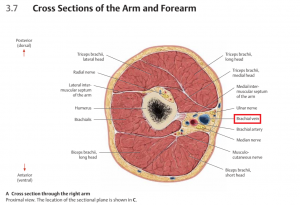Biceps Brachii: Difference between revisions
No edit summary |
No edit summary |
||
| Line 51: | Line 51: | ||
== Resources == | == Resources == | ||
<br> | [[Image:KDVFh.png|left|300x350px]] | ||
<br> | |||
== See also == | == See also == | ||
Revision as of 02:34, 26 April 2017
Original Editor - name here
Top Contributors - Esraa Mohamed Abdullzaher, Lucinda hampton, Kim Jackson, Joao Costa, Sai Kripa, Hing Long Yip, Wendy Snyders, 127.0.0.1, Admin, George Prudden and WikiSysop
Description[edit | edit source]
commonly known as the biceps, is a two-headed muscle that lies on the upper arm between the shoulder and the elbow.
Origin[edit | edit source]
Origin of Short Head: Apex of the coracoid process of
the scapula.
Insertion
[edit | edit source]
Tuberosity of the radius and aponeurosis of the biceps brachii (lacertus fibrosus).
Nerve
[edit | edit source]
Musculocutaneous C5, 6.
Artery
[edit | edit source]
Muscular branches of brachial artery
Function[edit | edit source]
Flexes the shoulder joint. The short head assists with shoulder adduction. The long head may assist with abduction if the humerus is laterally rotated. With the origin fixed, flexes the elbow joint, moving the forearm toward the humerus and supinates the forearm. With the insertion fixed, flexes the elbow joint, moving the humerus toward the forearm, as in pull-up or chinning
exercises.
Assessment[edit | edit source]
palpation[edit | edit source]
length test[edit | edit source]
Treatment[edit | edit source]
strenghening
[edit | edit source]
stretching[edit | edit source]
Resources[edit | edit source]







